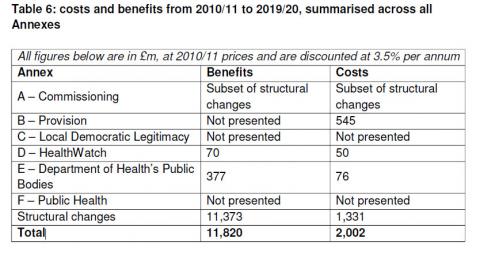NHS reforms: How much will shift to GP commissioning cost?
"The reorganisation is going to cost £3 billion itself" Dr Chaand Nagpaul, British Medical Council GPs' Committee
"It's going to save £5 billion." Andrew Bridgen, Conservative MP
Newsnight, BBC2, 7 June 2011
The scale of the savings the NHS will need to make regardless of whether the current set of reformscome to pass, mean that the costs of savings associated with the Government plans are crucial to the debate.
Those in favour of the plans insist the savings that will be realised from the transition to GP commissioning mean it is vital to press on, freeing up funds for 'the front line'.
Opponents argue that given the tight funding settlement the health service will have to manage, the wisdom of shelling out to set up the new system can be questioned.
Tuesday's Newsnight set the two arguments against each other. But are both the figures justified. Full Fact went in search of the answer.
Savings
Figures for administrative savings are provide in the Impact Assessment published by the Department for Health alongside the Health and Social Care bill earlier this year.
The assessment states that by 2014/15 there will be a one third reduction in the administrative costs associated with the NHS, as the table below shows.

This, according to the assessment, will mean "the gross savings attributable to the reduction in administrative spending from 2010/11 to 2014/15 are £5.2bn."
Yet this is only a gross saving, so to be properly representative it should take into account the costs associated with the changes.
After all, this reduction in administrative costs will involve redundancies, and the associated payments.
Costs
The impact assessment does provide estimates for the costs of the redundancies that will be associated with the structural reform of the NHS.
Some of those working at Primary Care Trusts will transfer to new roles with GP Consortia, meaning not all staff will be without jobs in the new structure.
The Department of Health estimates that around 60 per cent of staff will transfer from PCTs and SHAs to the new commissioning bodies. It estimates that the cost of redundancies across the whole NHS based on this assumption will be just over £1 billion (See table 4 on page 13).
But the Impact Assessment also acknowledges that there will be one off transitional costs associated with the planned changes to the structure of the NHS. These are estimated to total £377 million.
Combined, the assessment states that the costs "attributable to the changes in the system architecture" are £1.4 billion.
This is the figure for the impact of the structural changes to health services. The impact assessment does provide other data, taking in the overall costs of the Health Bill up to 2019/20 shown in the table below.

But even this more inclusive figure over the longer time frame is just over £2 billion, lower than the £3 billion figure offered on Newsnight.
Rather than coming from the Impact Assessment, this widely reported figure came from academic work.
Following the publication of the White Paper on NHS reform last summer, Professor Kieran Walshe of Manchester Business School produced an estimate for the costs of reforming the NHS based on National Audit Office assessment of the costs of other central Government departments.
His figures, published in the British Medical Journal estimated that "the proposed NHS reorganisation will cost between £2 billion and £3 billion to implement."
Some of the missing billion between the two estimates is accounted for by the use of the upper-end estimates in Prof Walshe's analysis as the final figure, but it is still some way higher than the figure produced by the Department.
Conclusion
Naturally, producing cost estimates for policies that not only have not been implemented, but have been subject to the recent listening exercise leaves plenty of scope for them to be revised in the future.
The claim that the structural reforms to the NHS will save £5 billion is backed up by the Department for Health's figures, although this is a gross rather than net figure.
The claim that the reforms will cost £3 billion could be disputed, given that the Departmental estimate for the cost of reorganisation is £2 billion, and only £1.3 billion of this is associated with the structural changes, including GP commissioning.
However when Full Fact contacted Professor Walshe when the impact assessment was published he told us he was sceptical of some of the figures produced by the Department for Health.
The NAO report he cited does warn that in very general terms the benefits of reorganisations by central Government Departments don't always realise the benefits that had been aimed at.
Time will tell if the Department of Health estimates will prove to be accurate.